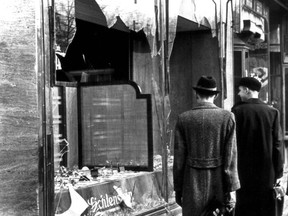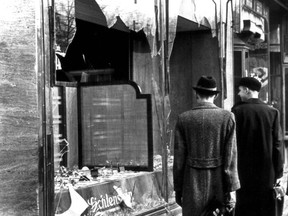Attacks on Israeli soccer fans in Amsterdam were especially shocking coming on the eve of the anniversary of the “Night of Broken Glass” in 1938.

Article content
The images from Amsterdam this week are terrifying. Israeli soccer fans chased through the streets amid shouts of “Free Palestine!” A man on the ground deflecting blows from assailants shouting, “This is for the children.” Another, amid punches, crying: “I’m not Jewish.”
Israel condemned the attacks, dispatched its foreign minister to the Netherlands and sent two airplanes to bring home its visiting citizens. The king, the prime minister and the mayor of Amsterdam denounced the violence. This was Amsterdam, after all, where Jews are prominent and Anne Frank and her family hid from the occupying Nazis in the Second World War.
Advertisement 2
Article content
To Deborah Lipstadt, the U.S. Special Envoy on Antisemitism, who is a Holocaust scholar, “It was terribly reminiscent of a classic pogrom.”
A classic pogrom. This on the eve of the anniversary of Kristallnacht, the most celebrated of pogroms, which took place November 9-10, 1938. In Berlin and beyond, Nazis assaulted and killed Jews, looted and damaged their shops, burned down their synagogues. It was called the “Night of Broken Glass”.
But what happened the other day in Amsterdam – which began as a clash the day before between supporters of the Israeli and Dutch clubs, a reflection of the bruising, incendiary culture of hooliganism characteristic of the sport – was not what happened in Germany.
Kristallnacht was sanctioned by the state, a new theatre in its prelude to “the Final Solution.” It followed five years of marginalizing, isolating and demonizing Germany’s 540,000 Jews, codified in the restrictive Nuremberg Laws in 1935.
But if Jews reflexively see Kristallnacht these days, it’s because they swim in a riptide of antisemitism. Since Hamas attacked Israel on October 7, 2023, and Israel subsequently invaded Gaza, antisemitism has flared everywhere. In the United States, which has the largest Jewish community outside Israel, Jews wonder if their golden age is over.
Advertisement 3
Article content
We see a new unease among Canadian Jews, especially in Montreal, where there were scores of incidents in 2023, where synagogues, schools and institutions have fallen into a nervous crouch, where my rabbi tells me he carries a gun.
So, if Jews see shades of Kristallnacht in attacks in Amsterdam, Paris or Montreal, forgive them their apprehension. The state is not persecuting them, as Germany did in 1938. But there is worry it might one day, particularly with the rise of the right in Europe and the U.S.
Eighty-six years after Kristallnacht, the spectre of authoritarianism shades the American conversation. Donald Trump, president-elect and emerging strong man, talks about being “dictator for a day.” Critics call him a “fascist”.
Trump trafficks artfully in antisemitism. While pointing to his Jewish daughter and son-in-law, he has kept company with antisemites and tolerated their stereotypes at his recent rally at Madison Square Garden.
We know the language Trump uses to vilify others, such as “vermin”. We know he talks of “the enemy within”, and calls the media “the enemy of the people.” We know he’s beloved by Christian nationalists, who think their faith alone should be America’s, leaving no room for others.
Today Jews live in a world of creeping authoritarianism and rising hatred. We get up and go to sleep amid a numbing foreboding that institutions will break, that the centre will not hold, and that anything can happen again, even Kristallnacht.
Andrew Cohen is a professor, a journalist and author of Two Days in June: John F. Kennedy and the 48 Hours That Made History.
Article content


Comments